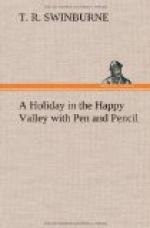Walter had the good fortune to come upon two fine stags not far from his camp almost as soon as he got there. He was within fifty yards of them as they were moving slowly in deep snow, and he killed them both; the best of these was a remarkably fine 10-pointer, length of horn 41 inches and span 38-1/2 inches. His wife spent an equal time in the same neighbourhood and never saw anything.[1]
When we talked over plans with Colonel and Mrs. Smithson at Pindi, the general idea had crystallised into a scheme for going into Astor to shoot, immediately upon our arrival in Kashmir, and, in order to reach Srinagar before April 1st—the date of issue of shooting passes—we had struggled hard to make our way into the country before it was really attractive to the ordinary visitor.
When we did reach Srinagar we found that our friends had abandoned all idea of an expedition to Astor, partly on account of expense, but principally on account of the backwardness of the season, which practically precluded ladies from crossing the Tragbal and Boorzil Passes for some time. The merits and demerits of the Tilail district and Baltistan came up for review, and then we almost decided to go to Leh until we reflected that the return journey over a bare and open country—arid and hot as an Egyptian desert—in the month of August might not be unmixed joy, and the Smithsons were assured that they would find no sport whatever en route, but would have to go several marches beyond Leh to obtain the chance of an Ovis Ammon or Thibetan antelope.
The Leh scheme thus having come to naught, and our friends being still wholly intent on “shikar” to the exclusion of all other pursuits, we decided to be independent, so we hired a nice-looking boarded dounga, whose fresh and clean appearance pleased us, for a term of three months. Nedou’s Hotel offered so few attractions and so many drawbacks that we were prepared to do anything rather than return to it, and, as a matter of economy, we scored heavily, as, on working it out, we found that the boat, including the cook-boat, would cost 60 rupees per month. Our food and the wages of those servants whom we should not have required at the hotel came to approximately 80 rupees per month, making a total of 140 rupees, or L9, 6s. 8d.; whereas our hotel bill would have come to 12 rupees per day, without extras—or 360 rupees (L24) per month—a clear saving in money as well as in comfort.
Our new habitation—the house dounga Moon—was owned and partly worked by Satarah, an astute old rascal, whose “tawny beard,” like Hudibras’—
“Was the equal grace
Both of his wisdom and his face;
In cut and dye so like a tyle
A sudden view it would beguile:
The upper part whereof was whey,
The nether orange mixt with grey.”
His costume consisted of a curious sort of short nightgown worn over white and flappy trousers, below which were revealed a pair of big, flat naval feet. The first lieutenant, Sabhana—sleek and civil-spoken, but desperately afraid of work—was, we understand, son-in-law to the Admiral Satarah, having to wife the Lady Jiggry, eldest daughter of that worthy, who, with her younger sisters Nouri, Azizi, and “the Baba,” completed the ship’s company.




